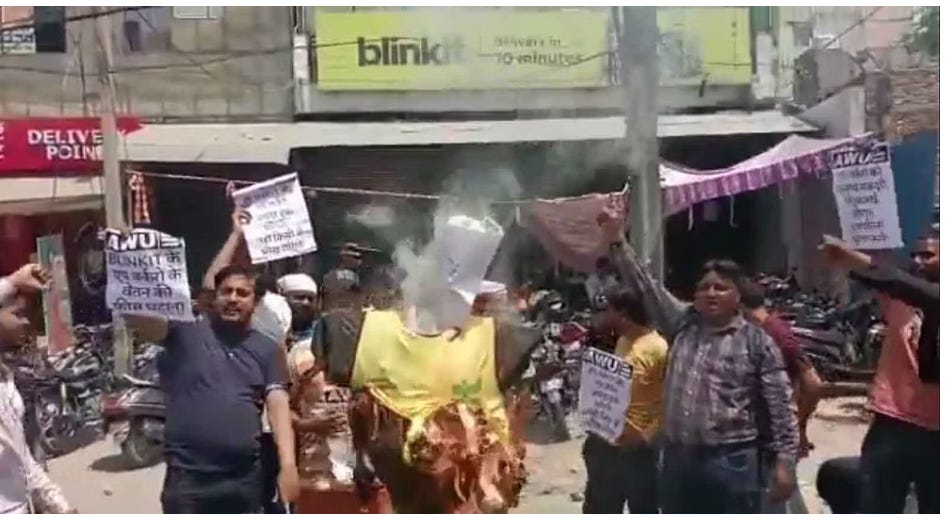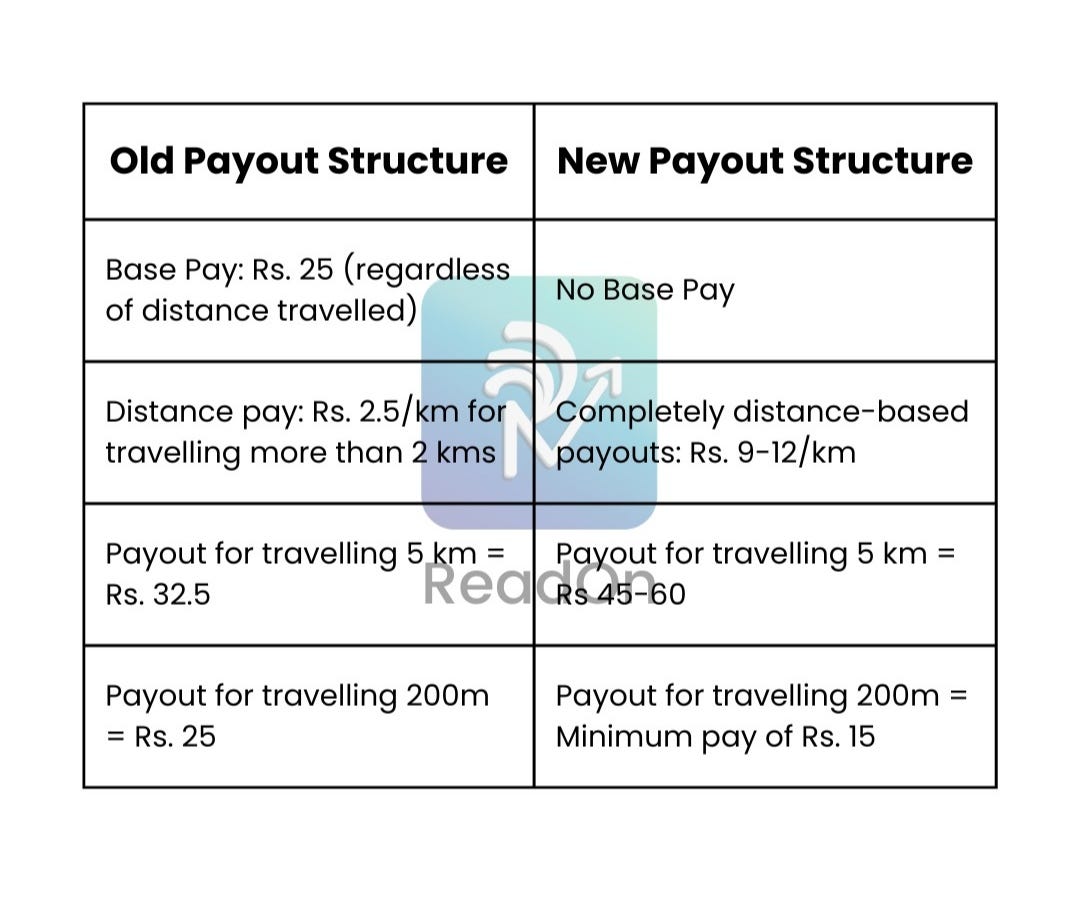🤨 Blinkit v/s the Delivery Partners: What’s Going On?
Blinkit's latest move could have a serious impact on India's gig workers. Wondering how? ReadOn!
Quick commerce has been a boon.
Want a quick shave? Get a razor in 10 minutes.
Have the midnight munchies? Get instant noodles instantly!
While quick commerce has been a blessing for customers, it is slowly making the livelihoods of delivery partners difficult.
While you eagerly wait for your order to arrive in 10 minutes, the delivery partner anxiously tries to reach you on time, come what may.
Now, they’ve realised that their small payouts are not worth it.
Blinkit delivery partners are protesting in Delhi-NCR.
All because of Blinkit’s new payout structure.
What’s wrong with this structure?
ReadOn!
📜 Blinkit’s New Payout Structure
Earlier, delivery partners were given a base pay of Rs. 50.
After Zomato acquired Blinkit, the base pay was reduced to Rs. 25.
And under the new payout structure, the base pay has been slashed!
Now, delivery partners will get effort-based pay, depending on the distance and time of day.
Source: The Morning Context
Let’s assume a delivery partner has to deliver an order 5 km away at 12 pm. The per kilometre rate at the time is Rs. 9.
So, the partner will earn Rs. 45.
How much would they get under the old system?
Base Pay = Rs. 25 + Rs. 2.5/km for orders beyond 2 km.
So, Rs. 32.5.
Now, suppose the partner has to deliver an order 200 metres away. Will they only get 4.5 paise? Nope, in such cases, they will get a minimum pay of Rs. 15.
And if delivery partners reach a certain level of earnings per day, they will get bonuses!
Sounds great, no?
Well, that’s just on the surface. Let’s dive deeper.
🥽 Blinkit’s New Payout Structure: Deep Dive
You see, the quick commerce system is designed to get you deliveries super fast.
For this, several dark stores are opened in an area and delivery partners deliver your order from the dark store closest to your house.
This means most orders that delivery personnel get are within a 2 km radius.
So, they can earn only an average of Rs. 15 per delivery!
Some delivery personnel have also been complaining of super low earnings.
We are not sure why the promised Rs. 15 minimum pay was not applicable here.
So, why did Blinkit take this drastic step?
🔍 Blinkit’s Motive
Well, Blinkit is chasing something that all startups want but very very few get: profitability.
Blinkit claims that the move aimed to bring profitability to some dark stores.
Looks like the move has backfired.
Forget profits, Blinkit could see a 1% decline in revenue in the April-June quarter because delivery partners are protesting and not taking orders.
Meanwhile, customers are shifting to Blinkit’s competitors.
BB Now orders jumped 46% in Delhi and 61% in both Gurgaon and Noida on April 13 and 14 compared to last month.
Zepto also saw a 40% jump in orders and Swiggy’s Instamart saw a 10-20% rise.
So, it's a lose-lose for Blinkit.
Delivery partners have now demanded five things from the company:
Increase minimum pay to Rs. 25
No changes in the payout structure
Guaranteed job security even if a partner is unable to log in for 20 days
Switch cash on delivery payments to store managers, so drivers don’t have to handle cash
Provide necessary amenities like water and toilets for drivers
These demands seem pretty basic. But will Blinkit give in to them?
📖 Blinkit’s Side of the Story
Well, it may not be able to.
Because Blinkit too is struggling.
Last year, it saw losses worth Rs. 1,400 crores!
In fact, it was on the verge of shutting down before it was acquired by Zomato (you can read about it here)!
Why?
You see, quick commerce isn’t sustainable.
Several countries have tried to make it work, but no one has succeeded in creating a profitable quick commerce company.
All because of the low average order values.
Quick commerce is designed to be ‘quick’: you don’t have to worry about planning your week’s groceries, you can just open the app and place an order!
Plus, the delivery fees that we, as customers, pay to these apps is not adequate to meet costs.
Result? They are trying to cut down costs by reducing the pay for delivery partners.
👀 Blinkit’s v/s the Gig Economy?
While delivery partners are protesting, they can’t protest for too long.
After all, how will they survive?
So, some delivery partners are back to work in Delhi-NCR.
Dark stores that were closed have opened up.
Zomato shares have risen 4.6% (as of 10:40 am on April 19).
This could set a dangerous precedent: powerful companies could potentially exploit workers who have no power.
And this could be super harmful to the 9 crore blue-collar employees who are expected to join the gig economy by 2028.
What can be done for the gig economy?
📜 Laws for Gig Economy
Right now, there are no laws governing gig workers in India.
That means they can only protest till their empty stomachs give in.
Only 3 companies Bigbasket, Flipkart and Urban Company currently give the local minimum wage to these gig workers.
This needs to change.
And this change will only come if the matter is taken up by the government.
The government needs to enact laws that will protect these workers and stop their exploitation.
And it needs to do it fast.
What more can be done to help these workers? Let us know in the comments.
If you liked this article then stop keeping us a secret. Share this with your friends on WhatsApp and help us grow! :)
If you are coming here for the very first time: Don’t forget to join us on WhatsApp to get daily updates! 👇





what is take home wage before and after this changes? on daily basis